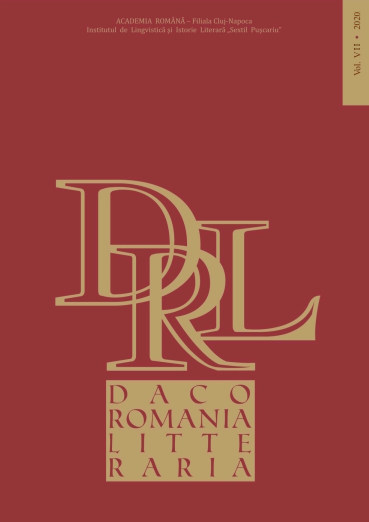BUCURA DUMBRAVĂ’S OUTLAW/ HAJDUK NOVEL
BUCURA DUMBRAVĂ’S OUTLAW/ HAJDUK NOVEL
Author(s): Constantina Raveca BuleuSubject(s): Language and Literature Studies, Studies of Literature, Romanian Literature, Theory of Literature
Published by: Academia Română, Filiala Cluj-Napoca
Keywords: social bandits; Iancu Jianu; outlaw; Romanian folklore and literature; Bucura Dumbravă;
Summary/Abstract: The Robin Hood type of outlaw hero, as delineated by Eric J. Hobsbawm in his seminal Social Bandits and Primitive Rebels: Studies in Archaic Forms of Social Movement in the 19th and 20th Centuries of 1959, has a counterpart in the Romanian folklore and fiction, namely the outlaw (hajduk) Iancu Jianu, who lived between 1787 and 1842. A folklore hero, he also became the protagonist of no fewer than sixteen novels, as well as a few movies. Iancu Jianu has been traditionally associated both to the social and to the national struggle for justice and independence, as his insurgence, highly praised by the common people through various heroic representations disseminated in ballads and sayings, coincided historically with the Greek War of Independence, when the Romanian principalities were ruled by the hated “phanariots”. The latter were offspring of privileged families living in the Greek district of Constantinople, who used to pay heavily for the throne, later deploying a bloody campaign to recover and increase their investment. This resulted in a cruel social and economic oppression, famine and even plague, which fuelled, among the poor and the dispossessed, the myth of an outlaw hero living in the woods, chased by the authorities, but robbing the rich to give to the needy. The paper analyzes Iancu Jianu’s literary representation in Bucura Dumbravă’s novels. She was, interestingly enough, both a lady in waiting for Queen Elizabeth (Carmen Sylva) and the acting president of the Romanian Theosophical Society. The paper scrutinizes both the patriotic imprints of the two novels and the spiritual symbols embodied in the plot, since Bucura Dumbravă’s noble intention was to illustrate the emergence of the Romanian identity as the gradual scenario of a heroic initiation whose final outcome is the emancipation of the spirit, of the intellect, and the victory of light against darkness.
Journal: Dacoromania litteraria
- Issue Year: 7/2020
- Issue No: 1
- Page Range: 154-163
- Page Count: 10
- Language: English

